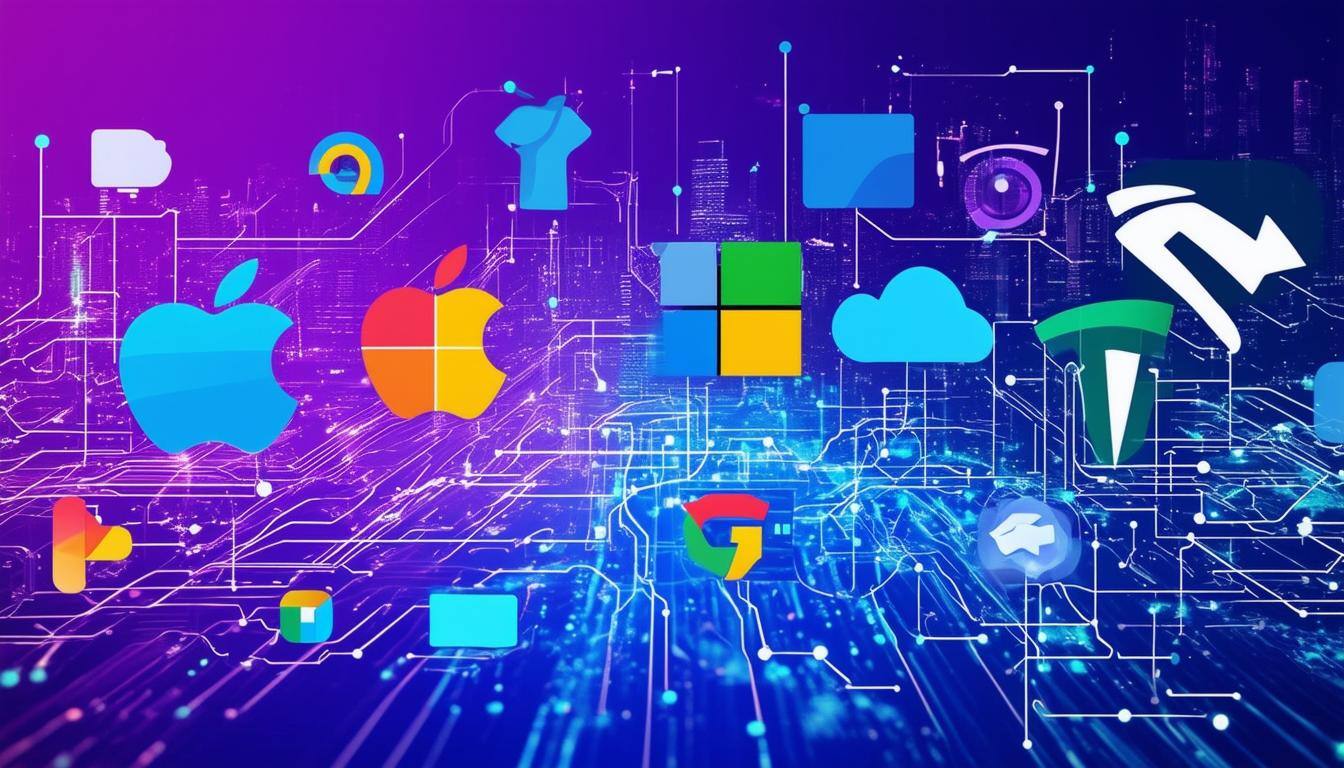
The 21st century has been defined by rapid technological advancements, globalization, and digital transformation. A handful of powerful companies have played a significant role in shaping industries, economies, and even society itself. These companies didn’t just achieve financial success—they revolutionized the way we live, work, and communicate.
In this article, we will explore the most influential companies of the 21st century, how they transformed their industries, and what we can learn from their success.
Apple
Apple is not just a technology company—it is a cultural phenomenon. From the iPod to the iPhone, Apple has redefined how people interact with technology and revolutionized the consumer electronics industry.
|
Feature |
Apple’s Impact |
|
Founded |
1976 |
|
Industry |
Consumer Electronics, Software |
|
Market Cap |
$2.8 Trillion (2024) |
|
Key Innovations |
iPhone, iPad, Mac, Apple Watch, App Store |
How Apple Changed the World
- The launch of the iPhone in 2007 changed mobile technology forever, making smartphones an essential part of daily life.
- Apple’s App Store, introduced in 2008, created a multibillion-dollar industry where developers worldwide could build and monetize mobile applications.
- Apple perfected the closed ecosystem model, where all devices (iPhone, Mac, iPad, Apple Watch) work seamlessly together, creating brand loyalty among users.
- Apple has set industry standards for user privacy and security, challenging competitors to improve data protection policies.
Key Lesson: Innovation and branding drive market dominance. Apple focuses on design, user experience, and exclusivity, making its products aspirational and iconic.
Google is more than just a search engine—it is the backbone of the internet, influencing how we find information, advertise, and work online.
|
Feature |
Google’s Impact |
|
Founded |
1998 |
|
Industry |
Technology, Internet Services |
|
Market Cap |
$1.8 Trillion (2024) |
|
Key Innovations |
Google Search, Android, YouTube, AI |
How Google Changed the World
- Google processes over 8.5 billion searches per day, shaping how the world accesses information.
- Google’s Android powers over 70% of smartphones worldwide, making it the most widely used operating system.
- Google’s acquisition of YouTube turned it into the largest video platform, revolutionizing entertainment, education, and marketing.
- Google leads in AI research, influencing everything from self-driving cars (Waymo) to medical AI.
- And if you’re looking for entertainment beyond technology, and want to play slots online, then Wanted Win Casino login Australia is the place for you.
Key Lesson: Data and AI drive global domination. Google leverages user data and AI-driven personalization to improve services and drive advertising revenue.
Amazon
Amazon started as an online bookstore but quickly grew into the largest online retailer in the world. Today, it dominates e-commerce, cloud computing, and AI-driven logistics.
|
Feature |
Amazon’s Impact |
|
Founded |
1994 |
|
Industry |
E-commerce, Cloud Computing |
|
Market Cap |
$1.6 Trillion (2024) |
|
Key Innovations |
Amazon Prime, AWS, Alexa, One-Day Shipping |
How Amazon Changed the World
- Amazon revolutionized online shopping, introducing one-click purchases, personalized recommendations, and ultra-fast delivery.
- With Amazon Prime, customers get fast shipping, video streaming, and exclusive deals, increasing customer loyalty.
- Amazon didn’t just change retail—it became the leader in cloud computing with AWS, powering major platforms like Netflix, Airbnb, and even government agencies.
- From Alexa voice assistants to automated warehouses, Amazon continuously pushes the boundaries of AI and robotics.
Key Lesson: Customer obsession and logistics drive market leadership. Amazon focuses on efficiency, scale, and AI-driven personalization to stay ahead.
Tesla
Tesla is not just a car company—it is an energy and technology powerhouse that disrupted the auto industry with electric vehicles (EVs), autonomous driving, and clean energy solutions.
|
Feature |
Tesla’s Impact |
|
Founded |
2003 |
|
Industry |
Automotive, Energy |
|
Market Cap |
$900 Billion (2024) |
|
Key Innovations |
Electric Cars, Autopilot, Battery Tech |
How Tesla Changed the World
- Tesla proved that electric cars could be fast, stylish, and practical, forcing traditional automakers to invest in EVs.
- Tesla’s Autopilot and Full Self-Driving (FSD) features are pushing the boundaries of autonomous driving.
- Tesla revolutionized battery production, making EVs more affordable and sustainable.
- Beyond cars, Tesla is leading in solar energy, battery storage, and grid solutions, helping drive a clean energy future.
Key Lesson: Disrupting the status quo leads to industry transformation. Tesla challenged traditional automakers, proving that sustainability and innovation are the future of mobility.
Microsoft
Microsoft has remained a technology giant for decades, evolving from software dominance to becoming a leader in cloud computing and AI.
|
Feature |
Microsoft’s Impact |
|
Founded |
1975 |
|
Industry |
Software, Cloud Computing |
|
Market Cap |
$2.9 Trillion (2024) |
|
Key Innovations |
Windows, Azure, Office 365, AI |
How Microsoft Changed the World
- Microsoft Windows and Office Suite became essential tools for businesses and consumers.
- Microsoft Azure is one of the biggest cloud computing platforms, competing with AWS.
- Microsoft’s acquisitions, including LinkedIn and GitHub, strengthened its dominance in professional networking and software development.
- AI-powered tools like Copilot are reshaping productivity and workplace efficiency.
Key Lesson: Adaptation and enterprise focus drive long-term success. Microsoft continuously reinvents itself to remain competitive in changing markets.
Meta (Facebook)
Meta (formerly Facebook) has transformed social interactions, digital marketing, and virtual reality, creating the foundation of the modern social media landscape.
|
Feature |
Meta’s Impact |
|
Founded |
2004 |
|
Industry |
Social Media, Technology |
|
Market Cap |
$900 Billion (2024) |
|
Key Innovations |
Facebook, Instagram, WhatsApp, Metaverse |
How Meta Changed the World
- Meta connects over 3 billion users through Facebook, Instagram, and WhatsApp.
- Meta’s ad platform powers millions of businesses, making it one of the largest advertising networks.
- Meta is pioneering the Metaverse, investing in virtual and augmented reality (VR/AR) as the future of digital interaction.
Key Lesson: Scale and user engagement drive digital dominance. Meta built a global platform, monetized user data, and is now betting on the future of virtual worlds.
Samsung
Samsung has become one of the most influential companies in consumer electronics, semiconductors, and mobile technology. While it started as a South Korean trading company in 1938, Samsung is now a global leader in multiple industries, competing directly with Apple, Sony, and other tech giants.
|
Feature |
Samsung’s Impact |
|
Founded |
1938 |
|
Industry |
Electronics, Semiconductors, Mobile Technology |
|
Market Cap |
$440 Billion (2024) |
|
Key Innovations |
AMOLED Displays, Galaxy Smartphones, Semiconductor Technology |
How Samsung Changed the World
- Samsung played a major role in the smartphone revolution, introducing its flagship Galaxy series, which remains one of the best-selling phone lines worldwide.
- The company is a pioneer in display technology, producing AMOLED and foldable screens that set industry standards.
- Samsung is the largest semiconductor manufacturer in the world, supplying chips to major tech firms, including Apple.
- The company continues to invest in AI, 5G, and IoT to expand its reach in future technologies.
Key Lesson: Diverse innovation and large-scale manufacturing create industry dominance. Samsung thrives by continuously adapting to technological trends while maintaining a strong presence in multiple markets.
SpaceX
SpaceX, founded by Elon Musk, has disrupted the aerospace industry, proving that private companies can successfully operate space missions while reducing costs and pushing the boundaries of space exploration.
|
Feature |
SpaceX’s Impact |
|
Founded |
2002 |
|
Industry |
Aerospace, Space Travel |
|
Market Cap |
Estimated $150 Billion (2024) |
|
Key Innovations |
Reusable Rockets, Starship, Satellite Internet (Starlink) |
How SpaceX Changed the World
- SpaceX developed reusable rocket technology, significantly reducing the cost of space travel.
- The Falcon 9 rocket became the first commercial rocket to successfully land and be reused, disrupting traditional aerospace models.
- The Starlink project aims to provide global satellite internet access, particularly for remote and underserved areas.
- SpaceX is leading efforts in Mars colonization, developing Starship, a fully reusable spacecraft designed for deep space exploration.
Key Lesson: Innovation and cost reduction can disrupt even the most entrenched industries. SpaceX’s focus on efficiency and reusability has reshaped modern space travel.
TikTok
TikTok, owned by ByteDance, is one of the fastest-growing social media platforms in history, reshaping content consumption, digital marketing, and influencer culture.
|
Feature |
TikTok’s Impact |
|
Founded |
2016 |
|
Industry |
Social Media, Digital Entertainment |
|
Market Cap |
Estimated $300 Billion (2024) |
|
Key Innovations |
Short-Form Video, AI-driven Content Recommendations |
How TikTok Changed the World
- TikTok popularized short-form video content, influencing social media trends worldwide.
- Its AI-powered algorithm creates highly personalized content feeds, increasing user engagement.
- The platform has transformed digital marketing, with brands using influencers and viral challenges to connect with younger audiences.
- TikTok’s success has forced competitors like Instagram (Reels) and YouTube (Shorts) to adapt and integrate short-form video content.
Key Lesson: Understanding user behavior and leveraging AI can lead to massive global influence. TikTok’s success demonstrates the power of personalized content and mobile-first entertainment.
Conclusion
The influence of these companies extends far beyond their respective industries. They have transformed the way people communicate, shop, work, and even think about the future. By leveraging innovation, technology, and strategic business models, they have disrupted traditional markets and created entirely new economic landscapes.
What makes these companies stand out is their ability to anticipate change and redefine industries rather than simply adapting to them. Whether through advancements in artificial intelligence, cloud computing, electric mobility, or social networking, they continue to shape global trends and consumer behavior.
As the 21st century progresses, new challenges and opportunities will emerge, but the impact of these companies will remain foundational. Their success demonstrates that innovation, adaptability, and a deep understanding of consumer needs are key drivers of long-term business influence. While the future may bring new industry leaders, the legacy of these companies will continue to inspire and shape the evolution of technology and global commerce.
Related Posts
Join the movement.
Your Entourage journey starts here. Join Australia's largest community of over 500,000 business owners and entrepreneurs, and receive instant access to exclusive content and updates delivered straight to your inbox.




